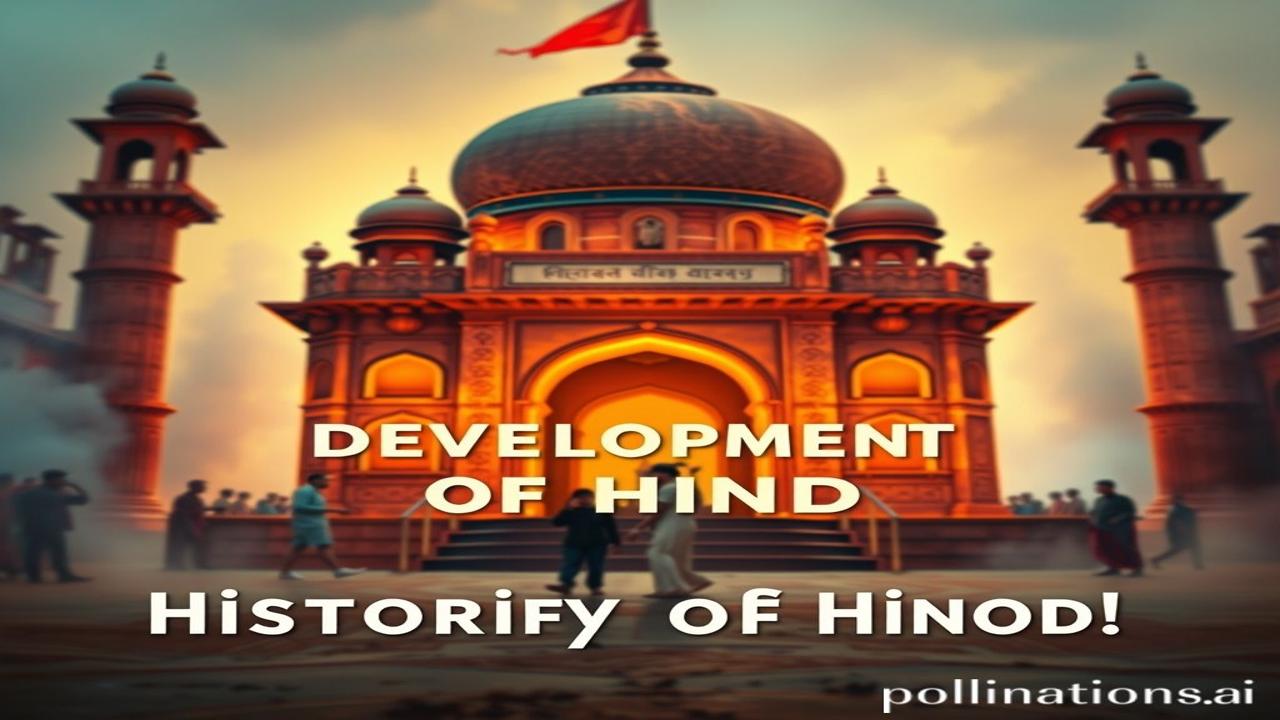Hindi Ki Kahani: Waqt Ki Dhool Se Ubharti Ek Bhasha
Kabhi socha hai, agar hum aankhen band karke apne purvajon ki aawaz sun paate, toh woh kaun si bhasha hoti? Woh kaun si boli hoti jo humare dil ke itne kareeb hoti ki har shabd, har ehsaas seedha rooh mein utar jaata? Haan, dosto, aaj hum usi bhasha, Hindi ki baat karenge. Hindi, sirf ek bhasha nahi, yeh toh humari धरोहर, humari pehchaan hai!
Hindi: Itihas Ki Gahraiyon Mein Doobi Ek Bhasha
Hindi ka itihas koi seedha-saada nahi hai. Yeh toh ek nadi ki tarah hai, jo kai dhaaraon se milkar bani hai. Iski shuruaat Vedic Sanskrit se hui, phir Classical Sanskrit aayi. Aur phir, aate aate, Prakrit aur Apabhramsa jaisi boliyaan aayi, jo aage chalkar Hindi ka roop le gayi.
So, basically, Hindi is like a family tree. Imagine:
- Vedic Sanskrit (around 1500 BCE): The grand-daddy! This is the language of the Vedas, humare sabse purane religious texts.
- Classical Sanskrit: The posh uncle! Refined, standardized, and used by scholars and writers.
- Prakrit & Apabhramsa: The cool cousins! These were the languages spoken by the common people, more relaxed and varied.
- And then BAM! Hindi, as we know it, starts taking shape around the 7th-13th centuries CE.
Hindi ka golden period medieval India mein tha, jab Sufi aur Bhakti saints ne is bhasha mein apne geet aur kavitaayein likhi. Amir Khusrau ne Hindi mein jo likha, woh aaj bhi logon ke dil mein basa hua hai.
Zameeni Sach: Sufi Sant Aur Prem Ki Bhasha
Imagine a dusty village in medieval India. A Sufi saint, clad in simple robes, sits under a neem tree, singing a soulful song in Hindi. His words are simple, yet they touch the hearts of everyone who listens.
“Prem bina jeevan kya hai? Prem toh jeevan ka saar hai!” he sings, his voice filled with emotion.
A farmer, after a hard day’s work in the fields, finds solace in his words. A young woman, dreaming of love, feels her heart swell with hope. Hindi, at that time, wasn’t just a language, it was a way of connecting with the divine, a way of expressing the deepest emotions.
Aur phir, imagine that time when poets like Malik Muhammad Jayasi wrote Padmavat and Tulsidas composed Ramcharitmanas. Yeh woh daur tha jab Hindi ne shakti aur kala dono ko apnaya tha.
Dharohar Aur Pehchaan: Aaj Ki Hindi
Aaj bhi Hindi humari pehchaan hai. Bollywood films ho ya gaane, Hindi humare dil ki awaaz hai. Aaj, while English is important, Hindi is that comforting hug from home. From chai ki dukan to news channels, it’s woven into the fabric of everyday life.
Hindi is not just a language of the past; it’s a living, breathing entity that continues to evolve. Look at Hindi literature today – the poems, the stories, the plays – they all reflect the changing realities of India, while still rooted in our cultural values.
Majedar Tathya Ya Bhram-Bhanjak: Hindi Ke Naam Ka Raaz
Log samajhte hain ki Hindi sirf Bharat mein boli jaati hai. Lekin asli sach yeh hai ki Hindi Fiji, Mauritius, Trinidad aur Tobago jaise deshon mein bhi boli jaati hai.
Also, did you know the word “Hindi” comes from the Persian word “Hind,” which means “land of the Indus River”? So basically, Hindi is “the language of the land of the Indus.” Cool, right?
Drishya Aur Bhavnaayein: Hindi Ki Dhun
Band karo aankhen. Imagine doing Holi. The air smells like gulal and mithai. The sounds of dhol fill the streets. People sing Hindi holi songs and you feel the bhakti filling your heart.
Now imagine the smell of burning incense sticks and the chanting of mantras in a temple. The air is thick with spirituality, and the sounds of Sanskrit blend beautifully with the sweet melodies of Hindi bhajans.
Antim Vichar Ya Uddharan
Hindi sirf shabd nahi hai, yeh toh ehsaas hai. Yeh toh humari sanskriti, humari pehchaan, humari dhrohar hai. Kabhi na bhoolna, iski kadar karna.
As Sant Kabir said,
“धीरे-धीरे रे मना, धीरे सब कुछ होय,
माली सींचे सौ घड़ा, ऋतु आए फल होय।”
(Dheere-dheere re mana, dheere sab kuch hoye,
Mali sinche sau ghada, ritu aaye phal hoye.)
Translation: “Take it slow, mind, everything happens slowly. Even if the gardener waters a hundred pots, fruits will only come in their season.”
So, let’s cherish Hindi and let it flourish, because it is deeply ingrained in humara dil!
